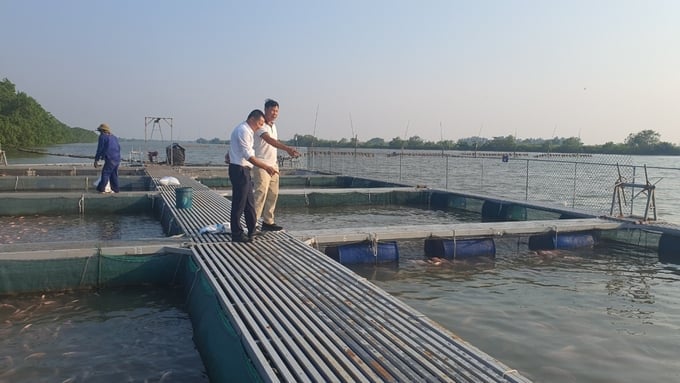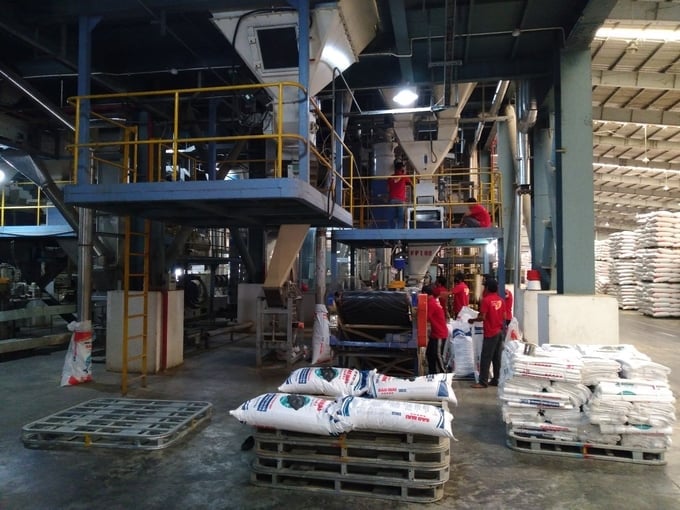May 30, 2025 | 01:14 GMT +7
May 30, 2025 | 01:14 GMT +7
Hotline: 0913.378.918
May 30, 2025 | 01:14 GMT +7
Hotline: 0913.378.918

The scientific research conducted by the Research Institute for Marine Fisheries has been widely deployed in aquaculture. Photo: Dinh Muoi.
Within the last few years, the application of biological technology research by the Research Institute for Marine Fisheries in practical settings has enabled businesses and farmers to reduce production costs, enhance productivity, and increase income from aquaculture and related seafood processing activities.
Concerted efforts have been made since 2019 to utilize biological technology in the production of high-value products, such as nutritious seasoning powder from shrimp and mackerel cad, or tilapia feed produced by utilizing hydrolysis technology on pangasius byproduct proteins supplemented with lysine from the resulting products of the fermentation process with microorganisms. These technological processes have been implemented in production facilities, contributing to the creation of value-added products from available seafood sources.
Additionally, scientists have applied biological technology in the production of nutritionally rich products, including the manufacturing of nutritious seasoning powder from shrimp and mackerel cad, and the production of tilapia feed produced by utilizing hydrolysis technology on pangasius byproduct proteins, supplemented with lysine from the resulting products of the fermentation process with microorganisms.
According to Dr. Nguyen Huu Hoang from the Research Institute for Marine Fisheries, the idea of utilizing byproducts from seafood processing for animal feed was not newly discovered. However, previous research efforts have only produced lysine supplements with low concentration levels, and industrial-scale production applications have been relatively limited.
Tilapia, a freshwater fish species, is capable of yielding high economic efficiency. However, aquaculture facilities are currently dependent on external feed suppliers with high costs and a lack of stability. Consequently, following successful research efforts conducted by scientists at the Research Institute for Marine Fisheries, significant progress has been made in advancing the research results from laboratory models to the commercialization phase.

The Institute's research results have been applied by businesses to produce industrial-scale feed for tilapia. Photo: VNCHS.
During the research process, scientists utilized the protease enzyme SEB-neutral PL for the hydrolysis process. Additionally, byproducts from pangasius processing were used, including heads, bones, and fins, as raw materials. After processing, this byproduct was transformed into a hydrolyzed liquid with a lysine content of 40% and a well-balanced amino acid mixture. This serves as a nutrient-rich, and easily digestible feed source for aquaculture.
Subsequently, based on the lysine-rich product extracted from pangasius byproducts, scientists formulated a tilapia feed at a scale of 500 kilograms of raw materials per batch. Experiments with this feed product indicated excellent growth in the tilapia, with a feed conversion ratio ranging from 1.15 to 1.29%, and an estimated profit of 18%.
"The product, with its high lysine content, digestibility, and high quality, is priced 10 to 15% lower compared to other tilapia feed available on the market. If a production line runs at the designed capacity, we can expect capital recovery within just over two years, with a net profit margin of 32.75%," detailed Dr. Hoang.
It is noted that in addition to the mentioned research, scientists at the Research Institute for Marine Fisheries have conducted numerous practical studies, including completing the scar tissue cultivation technology in elkhorn sea moss seed production, thereby bringing Vietnam into the group of successful adopters of this technology. They have also developed large-scale biomass cultivation technology at a low cost, providing effective support for aquaculture seed production.
According to Dr. Nguyen Viet Nghia, Deputy Director of the Research Institute for Marine Fisheries, biological technology has demonstrated multiple advantages in terms of addressing environmental issues and increasing the production efficiency of aquaculture. Upon completion, the research is transferred to farmers, businesses, or is collaborated with production units to increase the scale of production, contributing to solving economic challenges and enhancing the sustainability of the aquacultural sector.
Translated by Nguyen Hai Long
/2025/05/25/4127-3-073637_820.jpg)
(VAN) Thanks to the promotion from an FAO-implemented project, vegetable production in greenhouses in Moc Chau has seen strong development, from 1.5 hectares in 2021 to nearly 50 hectares in 2024.

(VAN) FAO has recently supported USD 140,000 to implement the project 'Risk mitigation human-animal interface risks through disease control initiatives in pig farming.'

(VAN) The People's Committee of Tra Vinh province has approved an adjustment to the investment policy for the Green Hydrogen Plant project, increasing its area to approximately 52.76 hectares.
![Reducing emissions from rice fields: [2] Farmers’ commitment to the soil](https://t.ex-cdn.com/nongnghiepmoitruong.vn/608w/files/news/2025/05/05/dsc08881jpg-nongnghiep-140632.jpg)
(VAN) Clean rice cultivation model in Thuong Tan commune, Bac Tan Uyen district, is assisting local residents in achieving sustainable agriculture by substantially reducing costs, increasing productivity, and protecting the environment.

(VAN) At the conference to disseminate Resolution No. 68, AgriS introduced its digital agricultural ecosystem and reaffirmed its commitment to accompanying the Government in promoting private sector development and sustainable agriculture.

(VAN) 'Blue Ocean - Blue Foods' initiative is designed to restore marine ecosystems and establish sustainable livelihoods for local communities by cultivating a minimum of 1,000 hectares of cottonii seaweed in the first three years.
/2025/05/21/4642-3-112707_603.jpg)
(VAN) The V-SCOPE project has made direct contributions to three out of six pillars of the Comprehensive Strategic Partnership between Vietnam and Australia.